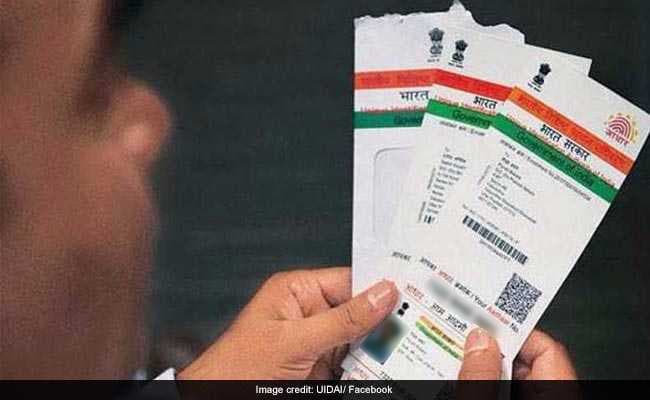
The Aadhaar program, a unique12-digit number, is key to PM Narendra Modi's 'Digital India' push
India considers ensuring timely delivery of food for millions of poor more important than heeding to concerns over privacy, the country's top law officer said while defending the biometric identity program.
Attorney General K.K. Venugopal told the Supreme Court the unique digital identity program, called Aadhaar, is "an enabler" to ensure food and other subsidies reach the poor and prevent rampant siphoning of welfare funds.
"Right to life is not merely a right to animal existence," Venugopal said in the Supreme Court on Thursday. "It is a right to live with dignity, food and livelihood. If you have no food and shelter, where is the question of privacy of these people?"
The Aadhaar program, which has assigned a unique12-digit number after collecting iris, fingerprint and face scans of over one billion Indians, is key to Prime Minister Narendra Modi's 'Digital India' push. It will become the single identifier for all schemes and services ranging from free food and subsidies to opening bank accounts and using mobile phones.
The court will be decide whether pushing the system's adoption into uses spanning buying a phone, getting utilities connected or conducting financial transactions online violates a citizen's privacy. The government claims Aadhaar is saving billions of dollars by better targeting beneficiaries of subsidized food and cash transfers but critics point to privacy concerns, unfair exclusions and data leaks.
Lawyer Shyam Divan, representing one of the petitioners, said that once the 12-digit number is linked to various services, the scheme offers the government a web of information about each individual and lays a framework for real time surveillance.
A ruling last August holding privacy a fundamental right was a shot in the arm for activists. The government maintains that the laws on Aadhaar data collection and use ensure that there is minimum "invasion of privacy."
13 Feet Wall
In defending the security of the database, the attorney general focused on its physical, rather than digital safety.
"Our data center has walls that are 13 feet high and 5 feet thickness. We have various safety precautions," Venugopal told the court.
The five-judge constitution bench headed by Chief Justice Dipak Misra also asked Venugopal to address the concerns of denying welfare funds in case of issues with the bio-metric database financial exclusions.
"If finger prints of a pensioner of 85 or 90-year-old is not working, where will he go?" asked Justice D.Y. Chandrachud.
The government argues the scheme has provision for exceptions for special classes of people. The hearing will continue in the coming weeks.
Attorney General K.K. Venugopal told the Supreme Court the unique digital identity program, called Aadhaar, is "an enabler" to ensure food and other subsidies reach the poor and prevent rampant siphoning of welfare funds.
"Right to life is not merely a right to animal existence," Venugopal said in the Supreme Court on Thursday. "It is a right to live with dignity, food and livelihood. If you have no food and shelter, where is the question of privacy of these people?"
The Aadhaar program, which has assigned a unique12-digit number after collecting iris, fingerprint and face scans of over one billion Indians, is key to Prime Minister Narendra Modi's 'Digital India' push. It will become the single identifier for all schemes and services ranging from free food and subsidies to opening bank accounts and using mobile phones.
The court will be decide whether pushing the system's adoption into uses spanning buying a phone, getting utilities connected or conducting financial transactions online violates a citizen's privacy. The government claims Aadhaar is saving billions of dollars by better targeting beneficiaries of subsidized food and cash transfers but critics point to privacy concerns, unfair exclusions and data leaks.
Lawyer Shyam Divan, representing one of the petitioners, said that once the 12-digit number is linked to various services, the scheme offers the government a web of information about each individual and lays a framework for real time surveillance.
A ruling last August holding privacy a fundamental right was a shot in the arm for activists. The government maintains that the laws on Aadhaar data collection and use ensure that there is minimum "invasion of privacy."
13 Feet Wall
In defending the security of the database, the attorney general focused on its physical, rather than digital safety.
"Our data center has walls that are 13 feet high and 5 feet thickness. We have various safety precautions," Venugopal told the court.
The five-judge constitution bench headed by Chief Justice Dipak Misra also asked Venugopal to address the concerns of denying welfare funds in case of issues with the bio-metric database financial exclusions.
"If finger prints of a pensioner of 85 or 90-year-old is not working, where will he go?" asked Justice D.Y. Chandrachud.
The government argues the scheme has provision for exceptions for special classes of people. The hearing will continue in the coming weeks.
Track Latest News Live on NDTV.com and get news updates from India and around the world

